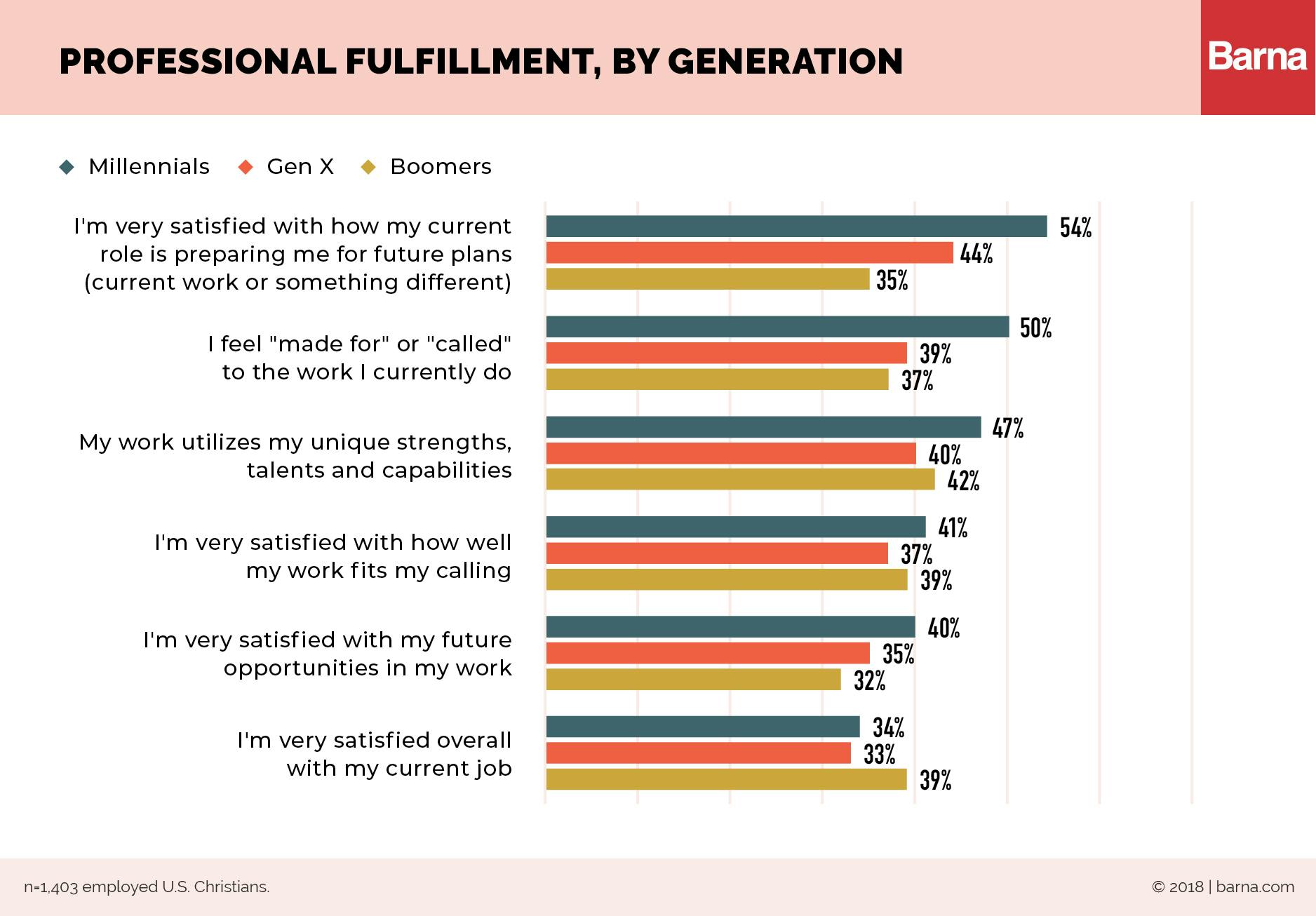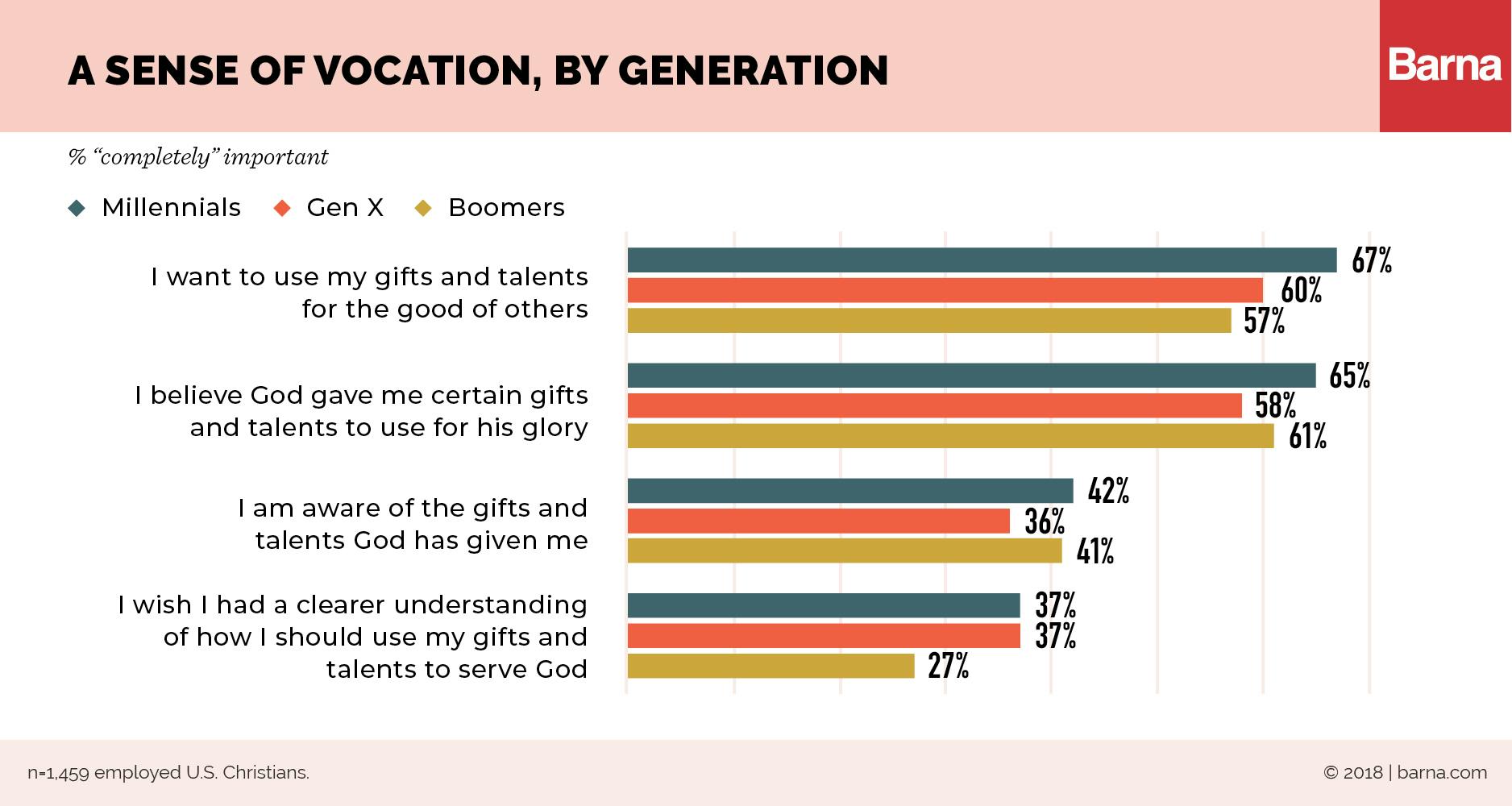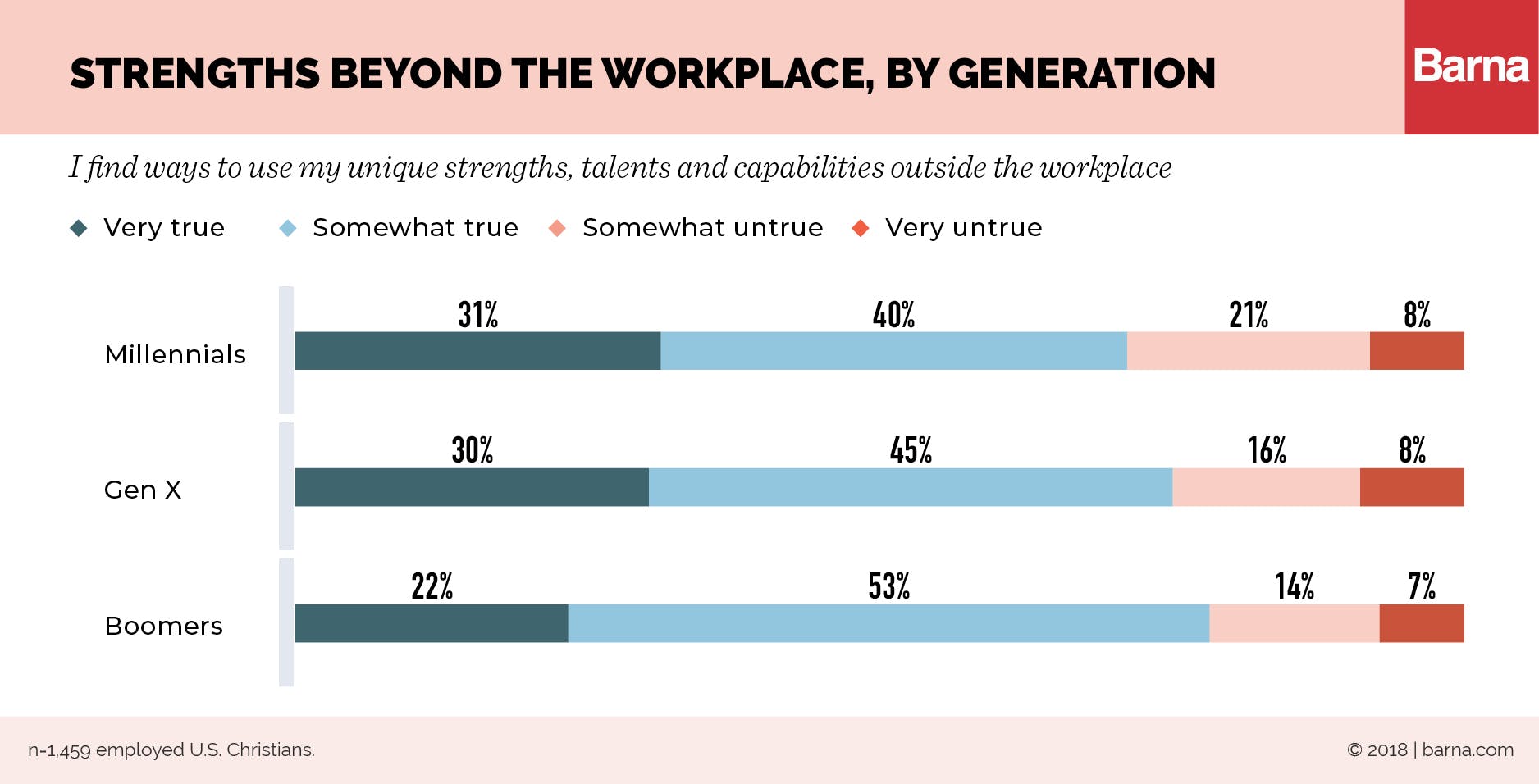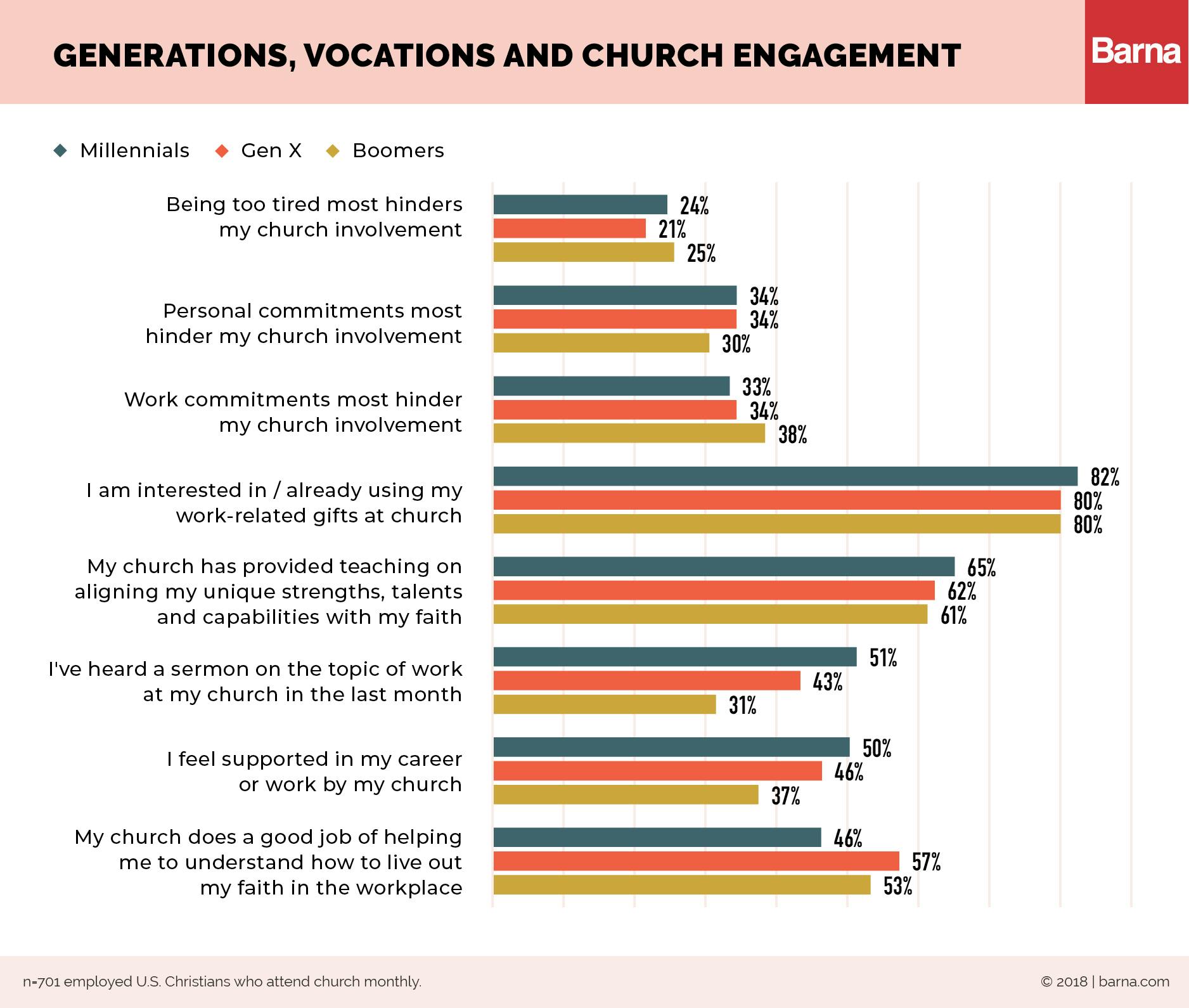
It’s graduation season again, and as more members of Gen Z transition out of high school and into their college years, they’ll do so with high expectations for their future careers. The generations before them, however—all at different stages in their careers—are wrestling with a different set of questions and concerns related to their work.
Christians at Work, based on a Barna study conducted in partnership with Abilene Christian University, breaks down how employed Christians understand and value their vocation. It’s not too surprising that Barna sees occasional differences in how the generational cohorts consider vocation via work, whether because of their season in life or because of the unique economic and professional climates in which they are building, or have built, their careers. For instance, though the economy has largely recovered from the recession, the working lives of many Gen X and Boomers have been marked by spells of unemployment or persistent debt, and the leading edge of Boomers is now preparing for retirement. Millennials, meanwhile, entered an unwelcoming job market at the beginning of their careers and are still dogged by low earnings, even as general wages have caught up to pre-recession levels. Still, Barna’s research at least suggests that the Christians in the largest generation in the modern labor force are buoyed in these formative working years both by a deep sense of ambition and by the hope of making a difference.
Millennials Appear Hopeful & Motivated in Their Vocation
Similar proportions of all working Christians, regardless of age, believe God gave them specific talents intended for his glory. From there, however, feelings surrounding vocation become more mixed, particularly when looking at the generational bookends of the labor force: Boomers and Millennials.
Christian Millennial workers appear to be finding a place for themselves and their capabilities in the workforce—half (50%) strongly agree they feel made for the work they currently do—and they are hopeful about their future prospects.

Millennials tend to be very conscious of their talents (42%) as well as hopeful for a better understanding of them (37%). They are also motivated to be generous with their unique skills; more than two-thirds (67%) report that they hope to use them in service of others, 10 percentage points more than the proportion of Boomers (57%) motivated by this idea. Overall, Gen X tend to align more with Boomers than Millennials, with some exceptions. Though Gen X are relatively satisfied with how their current role is preparing them for future plans (44%), just 36 percent feel aware of gifts and talents God has given them.

Boomers Express Less Enthusiasm About Future Opportunities
Boomers have less of a sense that they are “made for” their present work (39%) and they feel less urgency to deepen an understanding of their gifts (27%), but we shouldn’t assume that means they aren’t attuned to or using them. They express less enthusiasm about future opportunities, but that may be because they feel more presently secure, having already climbed (or grown skeptical of) the corporate ladder. And given that Boomers often tell Barna their identity is defined by family, we may simply be witnessing a natural shift in life priorities that comes with age. In other words, Millennials might expect more of their professional future because there is more of it, while Boomers are in a less exploratory, even stable, season of career. Regardless, they are similarly satisfied in their current work, and Boomers find purposes for their unique skills outside the office too (80% vs. 71% of Millennials say this is “very” + “somewhat” true), which bodes well for their golden years.

Younger Workers Feel Support but Need Direction
A strong majority of each church-attending generation aims to serve their churches through their professional skillset (82% of Millennials, 80% of Gen X, 80% of Boomers). As Boomers lean into retirement, they aren’t as confident in (or perhaps not as dependent on) their church for professional support (37% agree strongly), but a sense that church is a vocational asset trends upward among younger attendees (50% of Millennials, 46% of Gen X). Additionally, of working Christians who are in church at least monthly, Millennials more often report receiving sermons about work from their church (51% vs. 43% of Gen X and 31% of Boomers heard one in the last month)—a puzzling difference, presuming these groups are gathered in the same types of services. Some of this could depend on the makeup of a church body: If a congregation is generationally homogeneous, are attendees more likely to receive spiritual instruction generally tailored to their age and time of life? Or is this a result of Millennials looking for (and, it seems, finding) what they most need in their present professional moment? Whatever Millennials actually hear, they aren’t necessarily walking away from church feeling equipped with greater vocational understanding. Less than half say their church gives them a vision for living out their faith at work (46% vs. 57% of Gen X and 53% of Boomers agree “strongly”).

Just beyond Millennials is Gen Z, and it remains to be seen what kind of long-term engagement they may have with the Church at all. Currently, Barna finds, they primarily define themselves by academic or career success, with faith and family further down the list. This distinguishes them from other generations, including their parents, who might need some help in grounding the ambitions of their teens: One in four engaged Christian parents (24%) has talked with their son or daughter in the past year about integrating faith in their future career, and one-third of parents whose child attends church (34%) says addressing vocation is an area in which the youth program is weakest.
What the Research Means
It will be a significant and pivotal undertaking for churches to help emerging adults become more vocationally minded than career-oriented. As David Kinnaman and Bill Denzel write in the introduction to the Christians at Work report, “The Church has a huge opportunity—a responsibility even, given the profile of the emerging generation—to incorporate deliberate thinking about work into its discipleship and evangelism efforts.
“There is much to celebrate about Christians in the workplace! Christians are tuned in to the idea of calling, and many feel that their current jobs are well matched with what they perceive as their calling.
“But there are also warning signs all around our workplaces,” Kinnaman and Denzel note. “We see some gaps between generations at work and a potential lack of vision for how generations can mentor and support each other. Churches could do a much better job of helping Christians understand how to live out their faith in the workplace—particularly among those who have yet to discover their vocation or integrate faith and work.”
About the Research
A set of quantitative online surveys was conducted February 27–March 12, 2018, and April 18–May 8, 2018, using an online panel. The sample included 1,459 self-identified U.S. Christians who agree somewhat or strongly that their faith is very important in their life today and are employed (full-time, part-time or self-employed, including unpaid work for a family business). The margin of error for this sample is +/-2.3% at the 95% confidence level. Barna researchers set quotas to obtain a minimum readable sample by a variety of demographic factors, and weighted the data by ethnicity, education and gender to reflect their natural presence in the working population (using U.S. Census Bureau and Bureau of Labor Statistics data for comparison).
Photo by Daria Shevtsova on Unsplash
© Barna Group, 2019
About Barna
Since 1984, Barna Group has conducted more than two million interviews over the course of thousands of studies and has become a go-to source for insights about faith, culture, leadership, vocation and generations. Barna is a private, non-partisan, for-profit organization.
Related Posts
Lead with Insight
Strengthen your message, train your team and grow your church with cultural insights and practical resources, all in one place.
Get Barna in your inbox
Subscribe to Barna’s free newsletters for the latest data and insights to navigate today’s most complex issues.







